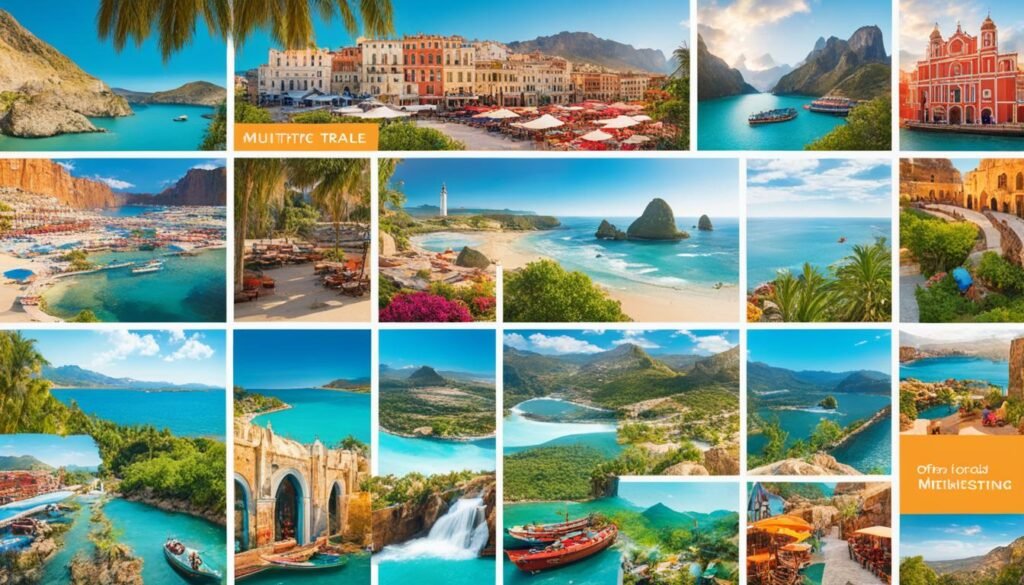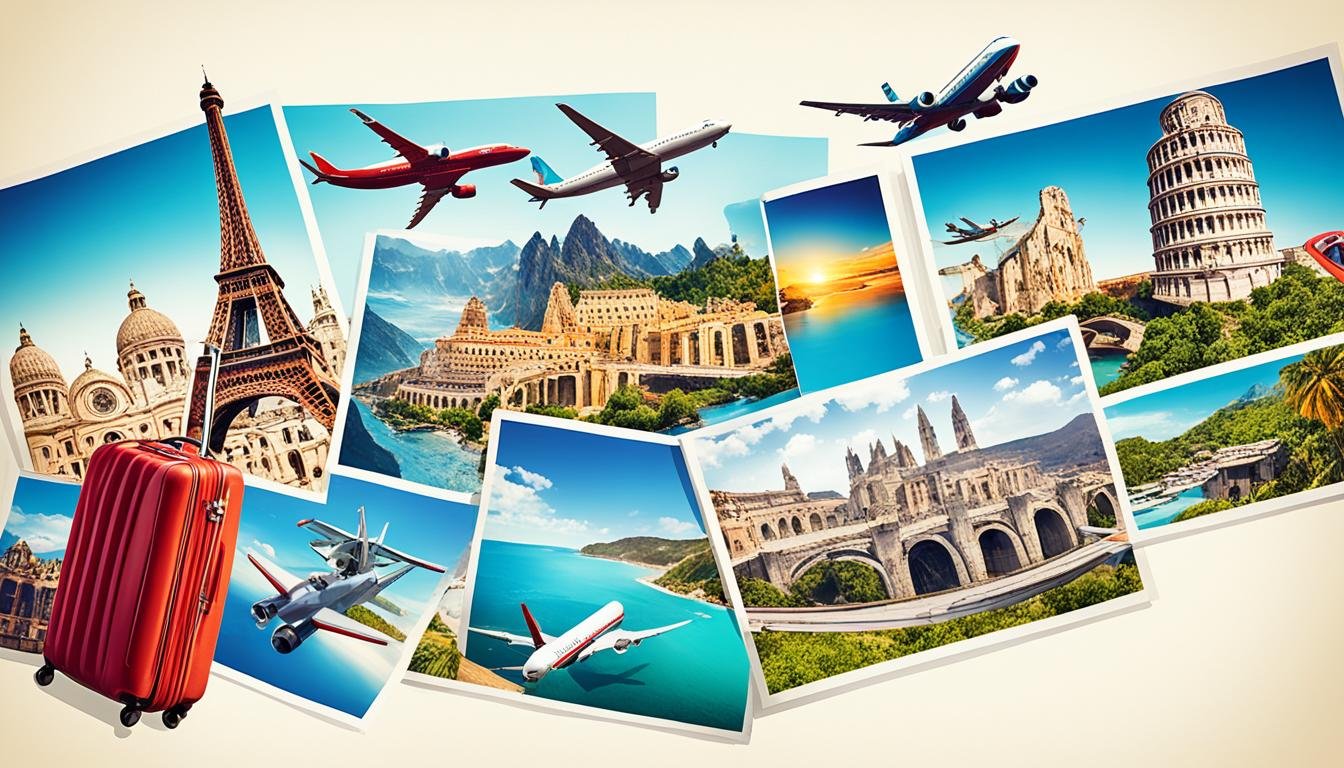Explore Travel and Tourism Marketing Essentials
Do you often daydream about your next trip? Maybe you imagine relaxing on a beach or exploring a lively city. Travel and tourism let us create memories and take a break from our daily lives. But, have you ever thought about how companies make us want to book trips?
There’s a lot to learn about how the travel industry markets itself. They use many different tricks to catch our eyes. Let’s look into some digital marketing tips for travel and tourism. This will help companies stand out and succeed in a crowded market.
But first, let’s share a story that shows why travel is so captivating.
Picture this: Sarah and Michael are at home, looking at social media. They see a gorgeous photo of a waterfall in South East Asia. This image sparks their interest in exploring new places.
As they dive deeper, they want to know all about this place. They check travel blogs, guides, and start imagining their trip. Sarah and Michael find most of their travel information online. This includes the best flight deals and local spots to visit.
This tale underlines why digital marketing is vital for the travel industry. From first glance to booking, the internet plays a big role. Thanks to the web, businesses can reach people like Sarah and Michael and make them want to travel.
Key Takeaways:
- Travel and tourism marketing involves various digital strategies to attract customers.
- Online research and booking are crucial for today’s travelers.
- Digital marketing helps businesses reach and engage with potential travelers.
- Creating inspiring and immersive online experiences is essential for capturing the attention of wanderlust-driven individuals.
- Understanding the power of digital marketing can lead to increased growth and success in the travel industry.
Importance of Digital Marketing in the Travel Industry
Digital marketing has greatly changed how people travel. It has made it simpler for travelers to find information, great deals, and connect with businesses. This happens through digital platforms and social media.
Digital marketing gives travel companies a chance to be seen around the world. They can reach people everywhere through the internet. This leads to more chances for them to grow and make money.
It also helps travel companies show off who they are online. With a strong online presence and smart digital strategies, they become known for great travel options. This helps them become a trusted choice.
Managing what people say about you online is crucial for travel companies. People look at reviews before deciding where to go. By keeping a good online reputation, these companies gain trust and win more bookings.
Digital marketing is also cheaper than older ways of advertising. Ads online, emails, and social media are cost-effective ways to talk to people. This is great for both companies and the people who are looking to travel.
Digital marketing allows for very targeted campaigns. Using data and tools, companies can create ads that fit exactly what people want. This is much more likely to lead to actual bookings.
This kind of marketing makes it easier for companies to talk to their customers more. Through social media and emails, companies can keep in touch with their customers. They can send info on new products, deals, and more. This makes customers want to come back over and over.
The Benefits of Digital Marketing in the Travel Industry:
- Increased reach and global audience
- Enhanced brand awareness and credibility
- Effective online reputation management
- Cost-effectiveness and efficient marketing spend
- Focused marketing campaigns and personalized messaging
- Greater customer engagement and loyalty
- Informing customers about new products and promotions
Digital marketing is crucial for travel companies today. Using digital strategies helps them stand out, get more customers, and grow. It’s a key tool in the digital world.
| Benefits of Digital Marketing in the Travel Industry |
|---|
| Increased reach and global audience |
| Enhanced brand awareness and credibility |
| Effective online reputation management |
| Cost-effectiveness and efficient marketing spend |
| Focused marketing campaigns and personalized messaging |
| Greater customer engagement and loyalty |
| Informing customers about new products and promotions |
Digital Marketing Strategies for Travel and Tourism Organizations
For travel and tourism groups, successful digital marketing is key in today’s competitive world. It lets them attract new people, up their web traffic, and increase sales. Now, we’ll dive into important digital marketing tactics that can really change the game.
Search Engine Optimization (SEO)
SEO boosts a site’s visibility and how it ranks on search pages. With better content and tags, travel groups catch the eye of folks planning trips. This leads to a higher spot in search results, more visitors, and more sales.
Email Marketing
Keeping in touch with customers is crucial for travel groups. Email marketing helps them stay in the loop with their audience and share great travel deals. When companies send personalized emails, they turn interested folks into real customers.
Social Media Marketing
Social media is a goldmine for travel groups wanting to connect with travelers. They post great content and beautiful travel photos to stir up interest. This helps them reach a ton of people, boost brand awareness, and send more visitors to their site.
Pay-per-Click Advertising
PPC ads are a big help in sending the right traffic to travel websites. By targeting certain keywords and creating ads that stand out, these groups snag people already looking to travel. PPC lets them focus on specific audiences, control costs, and easily track how ads are doing.
Using these strategies helps travel groups get noticed more online, bring in fresh faces, and grow their business. It’s key to always look at what’s working, what’s not, and make changes to keep ahead of the pack.
Digital Marketing for Tourism and Hospitality
Digital marketing is key for tourism and hospitality today. More people are booking online than ever before. A strong online presence is vital for drawing in customers. By using SEO, social media, and email marketing, businesses attract the right people and increase bookings.
Online branding is a big part of digital marketing for the travel and hospitality sector. A strong brand online helps attract travelers and builds loyalty. With good branding, businesses stand out and appeal to their target audience.
Personalization is crucial in this field too. Travelers love offers that fit their wants and needs. By customizing messages, businesses make customers happier and increase their bookings. Using customer data and automation tools helps offer personal experiences on a large scale.
A smooth digital experience is a must as well. Travelers look for easy, clear online interactions and booking processes. Having a website that’s easy to use, fast-loading, and mobile-ready boosts your chances of making a booking and satisfying guests.
Case Study: The Importance of Online Reviews
“Customer reviews have become an integral part of the decision-making process for travelers. In fact, 93% of travelers use online reviews to determine their accommodation choices. It is crucial for tourism and hospitality businesses to actively manage their online reputation and engage with customers through review platforms and social media.”
– John Smith, Marketing Manager at TravelCo
Building trust is vital. Businesses should work hard to manage their online image. Encouraging good reviews and handling bad ones quickly is important. Reviews really matter to those planning a trip; they help guide their choices.
The Impact of Social Media
Social media is a big deal for tourism and hospitality. It helps businesses reach and engage with travelers. Sites like Facebook, Instagram, and Twitter offer great ways to share photos, chat with followers, and advertise special deals or events.
The Power of Email Marketing
Email marketing still works well for keeping in touch and getting repeat business. Sending newsletters or special offers to people who’ve signed up can keep them interested and informed. It’s a good way to share new places or services with your customers.
| Digital Marketing Strategies for Tourism and Hospitality |
|---|
| Search Engine Optimization (SEO) |
| Social Media Marketing |
| Email Marketing |
Using these digital marketing methods can boost a tourism or hospitality business. By focusing on branding, personalization, and easy online experiences, and using social media and email well, companies can succeed in a tough market.
Connecting Stories with Travelers
In the travel and tourism world, stories are very important. They grab the interest of potential travelers. By using the power of storytelling, companies make online experiences that catch their target group. This inspires them to go on memorable trips.
Using digital tools is a great way to link stories with travelers. Websites can share images, videos, and articles. They can even use virtual reality (VR). All this helps travelers see the places, attractions, and things to do clearly. It makes them want to visit and experience new spots.
“Travel is more than just visiting a place; it’s about immersing oneself in its culture, history, and unique stories. By incorporating storytelling in travel marketing, businesses can create a sense of anticipation and curiosity, enticing travelers to uncover the hidden gems and fascinating narratives that await them.”
To create a flawless digital journey, travel websites should use Drupal. It’s a top-notch content management system (CMS) for handling many languages. This system helps provide a great user experience, no matter the language or device used.
Having a well-organized website design also matters. As much as the content, good design helps visitors find what they’re looking for. This adds to their enjoyment and makes exploring themes and places simpler.
Benefits of Storytelling in Travel Marketing
| Benefits | Description |
|---|---|
| Emotional connection | Storytelling makes an emotional link with travelers, making them dream and feel excited. |
| Memorable experiences | Narratives make travelers remember their adventures and share them with others. |
| Brand differentiation | It helps businesses stand out by showing their unique qualities and values. |
| Building trust | Real, authentic stories earn travelers’ trust by showing them true adventures and opportunities. |
| Inspiration and motivation | Engaging stories push and inspire travelers to live out their travel dreams. |
Being Responsive and Flexible
In the world of travel and tourism, staying flexible and ready to tackle challenges is key. COVID-19 showed how crucial it is to be adaptable. With travel rules and regulations shifting, it’s vital for companies to keep up and adjust their plans.
To be responsive, having a functional travel site is a must. A site that works well on any device gives travelers a smooth experience. People can easily view and book trips whether they’re on a computer, phone, or tablet.
Keeping up with the latest travel rules is also important. This helps businesses change their offerings when needed. If a place has new rules for entry, businesses should put that info online for travelers to see.
Enhancing Flexibility with Drupal
Drupal is a top choice for making travel sites more flexible and responsive. It has many features that help businesses adapt to any change.
This CMS can easily connect with other tools and tech, like real-time updates and booking systems. That means businesses can update their sites fast based on new travel rules.
Drupal is also great because it lets businesses add or remove features easily. This makes it simple to keep up with what travelers want and need.
It’s backed by a strong community that provides ongoing support. Regular updates and security patches help keep websites running smoothly and safely.
Immersive Experiences with Virtual Reality (VR)
With travel restrictions changing, VR offers a way for people to explore without leaving home. Virtual tours and experiences let travelers see different places up close.
Businesses can use VR to show off their hotels, sights, or events. It gives travelers a real feel for what they might see on their trips.
Building an Interconnected Web of Digital Experiences
For success, travel businesses should connect their online experiences. This means using different digital platforms to talk to travelers at every step.
For instance, a website can connect to social media for updates and to connect with travelers. Email can keep people informed and offer deals that match their interests.
Allowing users to add their own content, like reviews, helps others make decisions. Together, these digital experiences offer a complete way to draw in and keep travelers.
To sum up, being ready to change and meet new challenges is crucial in the travel world. Tools like responsive websites, Drupal, VR, and a connected online presence help businesses adapt and grow.
Stimulating Trips to Emerging Travel Attractions

Digital marketing is key when talking about new travel spots. It grabs the attention of folks thinking about going places. With tools like multisite in CMS, like Drupal, teams can work smart. This lets them easily handle content for many sites from one spot.
This setup does more than just stop copycat content. It makes running marketing smoother. Marketing folks can easily manage lots of sites. This keeps their focus sharp on getting the word out about each new place to see.
Using multisite, marketing teams get to tailor their game plans for every spot. This makes sure the message is spot on for each group they’re trying to reach. This detail makes travelers more likely to pick these new spots to visit.
Being efficient is vital for marketing’s success. Thanks to CMS like Drupal, dealing with many sites is easier. Instead of doing lots of site work, teams can put time into making great content and talking to potential travelers.
Multisite isn’t just for one spot’s site. It can cover a whole area’s spots or bigger ad plans, too. Pulling all these different sites under one roof makes everything smoother. This means more people might check out these new travel places, all thanks to better marketing.
Key Benefits of Multisite Functionality for Destination Marketing:
- Efficient content creation, update, and publishing for multiple attractions
- No duplicate content issues
- Streamlined content management for marketing teams
- Customization and personalization of marketing strategies for each attraction
- Improved efficiency and resource allocation
- Enhanced promotion of emerging travel attractions
- Consolidation of related domains for seamless content management
- Overall improvement in marketing results and visitation
Multisite features are a game changer for travel marketing. They help teams make attractions look great online. Good websites and messages can get people excited to go, creating unforgettable experiences.
Focusing on the Digital Traveler Needs
Travel and tourism websites must focus on digital traveler’s needs. They need to be easy to use with clear, up-to-date information. This includes easy navigation, simple contact options, and no barriers in user interaction.
User-friendly travel websites ensure information is accessible from any device. They work well on desktops, smartphones, and tablets. By making sites work on all sizes and devices, businesses meet digital travelers’ preferences.
Personalization is also crucial for a good user experience. Tailored content makes digital travelers feel special. By using data and analytics, businesses can offer travel suggestions and promotions that fit their audience.
“The key to success lies in understanding the wants and needs of digital travelers and crafting personalized experiences that exceed their expectations.” – Travel Marketing Expert
Drupal 9 is great for businesses wanting to personalize. It allows for easy integration with important tools and technology. This helps businesses stay current and meet their audience’s specific needs well.
Benefits of Focusing on the Digital Traveler Needs:
- Enhanced user satisfaction: Easy-to-use websites and personalized experiences make the online journey smooth and fun for digital travelers.
- Increased engagement: When websites meet traveler’s needs, they’re more likely to look around and book. This boosts interaction and interest.
- Improved customer loyalty: Personalization builds trust and loyalty. With tailored suggestions and offers, businesses create lasting connections.
In conclusion, it’s vital for travel websites to focus on digital traveler needs. This involves making sites easy and personal for a better experience. With Drupal 9, businesses can create digital spaces that make users happy, engaged, and loyal.
Personalizing User Experiences
Personalization is key in making travel marketing better for users. It helps marketing teams understand how users behave on websites. Then, they tailor landing pages and messages just for them. This strategy ensures users see info and deals that match what they like.
To make personalization broad, automation is used in travel marketing. This tool lets marketers automate tasks, saving time. With the extra time, they create unique experiences for their audience. Automation helps send personalized messages via email, social media, and customized websites.
Improving how users experience travel is crucial. By following the customer’s path, businesses can find what needs work. Marketers use this insight to make the journey better. They offer personalized tips, deals, and rewards to improve the travel adventure.
Insights-driven marketing automation allows for continuous optimization of landing pages, improving engagement and conversion rates.
The aim of personalized travel marketing is to make fans of the destination. This is done by offering unique and personalized trips that inspire sharing. Positive reviews and online buzz can attract more visitors. This helps in growing the destination’s popularity.
Benefits of Automation for Personalized Travel Marketing
Using automation in travel marketing has many upsides:
- It makes marketing more efficient, saving time.
- Marketers can send messages and deals that target specific groups, making them more engaging.
- There’s a consistent look and feel to the brand across different channels.
- Scaling up personalized marketing efforts is easier with automation.
- Marketers get a lot of data that helps them make better decisions about the campaign.
Enhanced User Journeys through Personalization
Personalized user journeys make a big difference in the travel experience. Here’s how to do it:
- Use what you know about users to suggest the best destinations and travel plans.
- Give them special offers or promotions that match their preferences or loyalty status.
- Be there to help in real time, through chat, or email, making their journey smooth.
- Continue to offer personalized help even after their trip, suggesting future destinations or thanking them for their review.
Mixing automation with personalized experiences makes travels unforgettable. It not only makes customers happier but also helps in growing the business. In the competitive travel world, personalization is a key to attracting and keeping travelers.
Hassle-Free Digital Experiences
Drupal 9 is perfect for creating amazing digital experiences on travel sites. It comes packed with features that make using it smooth, no matter what device you’re on.
It’s also great for getting your site noticed online. Sites made with Drupal are set up to rank well in search engines. This way, folks looking for travel spots are more likely to find you.
Handling your site’s content with Drupal is super easy. It has a simple interface and lets you manage everything effectively. You can update your site with new stuff without a lot of hassle.
It also works well with high-level search tools like Apache Solr. This makes it easy for users to quickly find what they’re looking for on your page.
Upgrade to Drupal 9 means your travel site will work better and show up more online. Your pages will load fast, and more people will see your site in search results. This all leads to more visitors, better offers for them, and more success for your business online.
Incremental Growth and Critical Integrations
Travel websites need constant support to keep their quality high. Businesses in travel and tourism should invest in support and maintenance services. Doing this helps their websites run well and keeps users happy.
Working with an IT support team brings many advantages. They help with updates, make sure sites are safe, and improve search results. Thanks to great IT support, travel companies can relax, knowing their websites are doing their best work.
It’s also important for websites to work well with different digital spots and apps. This creates a smooth experience for users. It makes their digital journey better and travel more enjoyable.
“Effective support and maintenance are vital to the long-term digital transformation and growth strategies of travel and tourism businesses.”
Support and maintenance are crucial for travel and tourism companies. They make sure their websites are always top-notch. This dedication to quality helps meet travelers’ changing needs and pushes the industry forward.
Conclusion
Today, digital marketing is key in the travel and tourism industry. It helps businesses connect with their audience better. With good digital strategies, companies can reach more people, boost their brand, spend less money, and engage with customers.
For success, businesses need to focus on digital-savvy travelers’ needs. This means making websites easy to use and full of helpful, specific information. Personalized online experiences can really make customers happy and help the company grow.
Getting a strong foothold in digital marketing is important. Partnering with digital experts can really help a business stand out. It keeps them aware of new trends, which can help them meet their marketing targets and do well in the competitive market.
FAQ
Q: What is travel and tourism marketing?
A: Travel and tourism marketing are the ways businesses in this field draw in customers. They use online and offline methods to show people their services and products. This includes ads on websites and in print, plus social media.
Q: Why is digital marketing important in the travel industry?
A: Digital marketing is key in the travel world because it lets companies reach a larger group of people. It makes it easier for travelers to learn about places and deals online. This can build strong loyalty with customers.
Q: What are some effective digital marketing strategies for travel and tourism organizations?
A: For travel businesses, digital marketing can involve many tools. It includes improving websites so they show up in online searches more. Sending emails to stay in touch and using social media to interact with travelers are also important.
Q: How does digital marketing benefit the tourism and hospitality industry?
A: Digital marketing helps tourism and hospitality businesses welcome more people and increase their online visits. It boosts how well they’re known and spreads the word about new offers. It also manages their online image and updates travelers about recent changes.
Q: How can travel and tourism businesses connect stories with travelers?
A: Companies share adventures with travelers using digital tools like pictures, videos, and articles. This gives a sneak peek into the fun and uses virtual reality to really engage people. A user-friendly system such as Drupal makes these experiences smooth.
Q: How can travel and tourism businesses be responsive and flexible in the face of global events?
A: During big events, the right technology and setup can help businesses quickly change plans. They can make their websites better, like switching to Drupal. Utilizing virtual reality then is one way to keep travelers interested.
Q: How can digital marketing stimulate trips to emerging travel attractions?
A: Marketing digitally can grow interest in new spots. Using a powerful CMS, like Drupal, helps teams manage attraction websites easily. This makes marketing smoother and more effective.
Q: How can travel and tourism websites meet the needs of digital travelers?
A: Websites can make sure they’re user-friendly and informative on any device. They need to be easy to use and provide quick ways for people to reach out. Everything should be straightforward and without obstacles.
Q: How can personalization enhance user experiences in travel marketing?
A: Learning about what users like and personalizing pages for them is huge. Tools like marketing automation make it easier to send tailor-made messages. This wins over more people to visit and love a place.
Q: How does Drupal 9 enhance digital experiences for travel and tourism websites?
A: Drupal 9 is great for making travel websites faster, better for search, and simpler to manage. It supports features like Apache Solr to make searching better. This makes travel info more accessible and enjoyable for users.
Q: Why is ongoing support and maintenance important for travel and tourism businesses?
A: Regular support keeps travel sites running well. It’s crucial for updates, security, and staying visible online. A strong digital base supports growth and keeps customers satisfied.
Q: Why is digital marketing crucial for travel and tourism businesses?
A: Digital marketing is key for travel because it allows them to keep up and grow. It makes it easy to connect with people, build recognition, and save costs. Good strategies attract customers and meet digital traveler needs.







